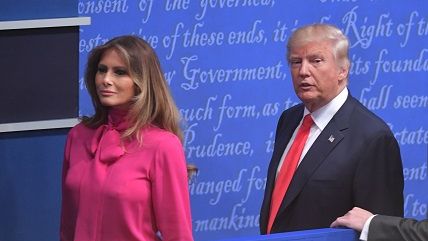Is Donald Trump Trying to Prove Feminists Right About Rape Culture?
A feminist screenwriter couldn't have come up with a better male chauvinist villain.

Since the script writers for the lowbrow comedy-drama called "2016" are fond of bizarre twists and turns, no one knows for sure whether Donald Trump's quest for the White House will be undone for good by the 11-year-old candid audio in which he brags about his sexual advances toward women. Nonetheless, it is clear that the so-called "pussy tape"—in which Trump tells then-Access Hollywood host Billy Bush that his star status allows him to "do anything" to pretty women, including "grab them by the pussy"—has dealt a serious blow to Teflon Donald, until then largely unscathed by unsavory incidents.
Is this a sign of changing attitudes toward sexual misconduct—specifically, feminist-driven refusal to tolerate behavior once brushed off as "boys will be boys" but now unequivocally seen as assaultive and misogynistic? The response to Trump's repulsive comments has been undoubtedly affected by the prominence of gender issues in this election and the fact that it follows a resurgence of feminist activism intensely focused on sexual violence. But as the experience of earlier generations shows, the cultural winds can shift in unpredictable ways.
Pussygate (who could have imagined the ways in which Trump would enrich our political vocabulary?) has inevitably elicited comparisons to the scandals surrounding Bill Clinton in the 1990s. That Hillary Clinton is now Trump's Democratic rival for the presidency just makes the parallels all the more relevant.
Bill Clinton survived the scandals—both the revelation of the affair with Gennifer Flowers during his 1992 campaign and the later claims of sexual harassment and assault as well as the disclosure of the affair with White House intern Monica Lewinsky. Whether this attests to the benighted sexual politics of the 1990s, frequently portrayed these days as a pre-feminist Dark Ages, is another matter.
It's easy to forget that the early 1990s were another major feminist moment. That was when Anita Hill's testimony at the Clarence Thomas confirmation hearings turned into a "national teach-in" on sexual harassment, the 1992 elections became the "Year of the Woman," moderate Republican Bob Packwood was undone as a serial harasser, and the trials of William Kennedy Smith, Mike Tyson, and O.J. Simpson generated intense discussions of acquaintance rape and domestic violence. Even the modern-day conversation about campus rape is large a replay of a 1990s debate that landed on the cover of Time magazine.
Clinton weathered the storm for several reasons. For one, his only proven improprieties involved consensual adultery. But no less importantly, feminists—including First Lady Hillary Clinton—stood by him. Women's movement veteran Gloria Steinem even claimed that an unwanted advance, however lewd and aggressive, was not sexual harassment if its initiator took "no" for an answer. (This was dubbed the "one free grope" defense, likely not available to Trump.) At the time, I wrote that feminist hypocrisy on the Clinton scandals was helping undo the excesses of ideological zeal which had sought to purge the workplace of all sexuality and treat accusations of sexual wrongdoing as proof of guilt.
Fast-forward to the Trump candidacy and Pussygate. Like Clinton, Trump has faced several allegations of sexual assault, none proven, and has a known history of adultery; unlike Clinton, he has also talked publicly about bedding married women. The "pussy tape" contains what can be read as a confession to sexual assault—though, in my view, it sounds more like sexual trash talk. (Trump's actual behavior to soap actress Arianne Zucker on the same tape is quite different from the aggressive moves he brags about). Even so, it's a fairly vile kind of trash talk. Had Clinton been caught on tape bragging that his status as a politician allows him to grope women with impunity, it would very likely have turned public opinion against him—and killed his chances if released pre-election.
Yet it also makes a difference that no feminists, progressives, or mainstream journalists are likely to defend Trump or minimize his actions; if anything, they will lean in the opposite direction of casting his words in the most literal and negative light possible. Indeed, much like the Thomas confirmation hearings almost exactly 25 years ago, Pussygate has become a consciousness-raising moment on sexual abuse, with the social media a powerful instant amplifier of women's stories.
There is no doubt that sexual predators in position of power—usually male—have far too often gotten away with victimizing the vulnerable, usually women or children. Curbing such abuses is an important step toward justice. Nonetheless, the heightened focus on sexual abuse has its dark side, now as in the early 1990s—including the stigmatization or even demonization of male sexual interest in women, the cult of female victimhood, the tendency to portray complex male-female sexual dynamics as a one-sided affair with abusive males and abused females, and the push to police sexuality.
Eventually, for one reason or another, the tide will probably turn back. But the irony of the present moment is that Trump, the man whose candidacy is fueled in large part by a revolt against political and sexual correctness, is giving the victim feminist narrative of America as a "rape culture" a boost. A feminist scriptwriter out to create a male chauvinist villain could have done no better.


Show Comments (207)